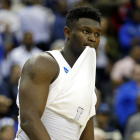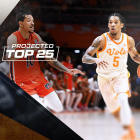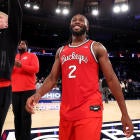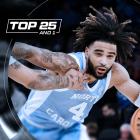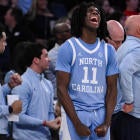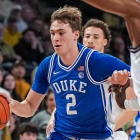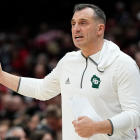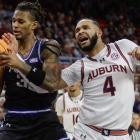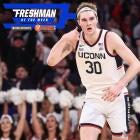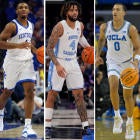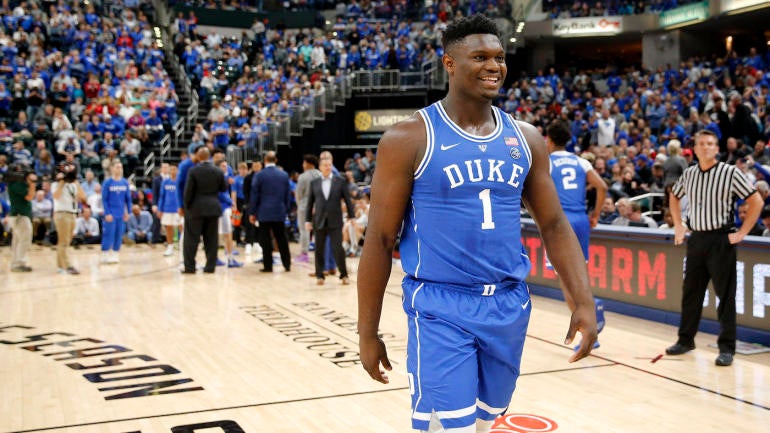
NEW YORK -- A lavish suite adjacent to the famed Fountains of the Bellagio, right on the Las Vegas Strip. Sapphire-blue mood lighting setting the scene, with lounge chairs to complete the vibe.
And a concealed camera to capture it all.
The smooth-but-sticky, slick-yet-grubby essence of college basketball recruiting was seen for hours on Thursday on the 23rd floor inside the Moynihan United States Courthouse. The most explosive day yet of the second college basketball corruption trial brought about allegation on top of allegation, looping in the biggest schools and coaches in the sport and, yes, once again, even Zion Williamson.
Federal prosecutors continued to show video wiretaps, some conversations that included multiple/separate meetups with assistant coaches along with key government cooperating witness Marty Blazer and aspiring sports agent Christian Dawkins, who was convicted in the first corruption trial, in a suite inside the glitzy, faddish Cosmopolitan of Las Vegas in late July 2017.
Assistant basketball coaches from USC (Tony Bland), Creighton (Preston Murphy) and Texas Christian (Corey Barker) -- all donning team gear, all stealing time away from when they were supposed to be at tournament and recruiting, all unaware of what they were being caught doing -- were shown accepting cash payments of $13,000, $6,000 and $6,000 respectively. The video was buttressed by testimony from Blazer, who was in the suite when the money swapped hands. Blazer also testified that Lamont Evans, who was at Oklahoma State at the time, was delivered $4,500 on his trip to Las Vegas.
"They're all cheaters, his whole f---ing staff," Dawkins says of Jamie Dixon's TCU program on one of the videos.
Barker was fired by TCU in March. Murphy, who is seen in the video sporting a smile and fondling his cash before slipping into the right pocket of his gym shorts, was put on leave by Creighton in March. He's still listed as a coach on Creighton's official site.
In Bland's video, he discusses the importance of recruiting then-No. 1 prospect Marvin Bagley III, who USC was trying to lure to campus.
"Tony (Bland) needed money to get to Marvin (Bagley III)," Blazer said from the stand.
Blazer has cooperated with the government for years after pleading guilty to siphoning more than $2.3 million from clients, many of whom were professional athletes. The prosecution wrapped its direct examination of Blazer on Thursday and brought a flurry of accusations -- with compelling video evidence to support it.
"He wasn't going to go to UCLA or go to Duke," Blazer said of the discussion regarding Bagley's recruitment at that point. "Tony was confident he had Marvin Bagley locked in at USC. When Marvin Bagley signs with USC, I need you guys on campus the moment he signs, be ready to get it to him ASAP."
The video captures Bland saying of Bagley's recruitment and potential working relationship with Dawkins and Blazer: "They're not going anywhere. … If he's at USC, you will meet him the first day on campus. This is the type of dude that, you get him, everybody will follow."
Despite thoughts to the contrary, Bagley eventually signed with Duke, reclassifying a year ahead of time and enrolling for 2017-18, where he played one season before leaving for the NBA Draft in 2018. He was the second overall pick and is now a member of the Sacramento Kings.
Another covert video capture from that same Las Vegas suite in 2017 showed current Clemson assistant basketball coach Steve Smith talking to Dawkins, Blazer and the FBI agent about the recruitment and potential payments to be made to Zion Williamson's family. Smith discusses Williamson's stepfather, who was also the coach of Williamson's grassroots team with Adidas, and makes reference to a clandestine meeting scheduled between he and the stepfather in Las Vegas.
Smith was there to sell himself, to sell his connections. Williamson was a once-in-a-lifetime opportunity. The assistant references how familiar he was with Williamson to the point he knew the exact time it took to get from Clemson's arena to Williamson's house -- 1 hour, 4 minutes -- and even laughs as he recalls a story about pretending not to know where he was going the first time he and Clemson head coach Brad Brownell visited. (It would have been against NCAA rules for Smith to do so.)
As Smith discusses the recruitment, Dawkins interjects: "Duke is gonna have their resources. UNC is UNC. Kentucky is gonna have their resources."
All three schools were recruiting Williamson, who at the time had just hit a new level of fame. The then-17-year-old was two days removed from a highly publicized and attended Adidas standalone/feature game vs. LaMelo Ball that was so packed, LeBron James was told it was better if he didn't show up for fear of crowd control.
Under oath, Blazer said he understood Dawkins to be saying: "Duke, UNC and Kentucky will have people in place to pay whatever's necessary for Zion Williamson. Whatever Zion Williamson's family needed, we would be able to step in and [help with money] if it was close."
In the first college basketball corruption trial, in October, the recruitment of Williamson came into question after testimony brought forth allegations that Kansas was willing to engage in discussions that centered around paying Williamson's family. Williamson, of course, went on to Duke and became arguably the biggest star college basketball has seen in decades.
He's since declared for the NBA Draft and is considered a borderline lock to be the No. 1 pick. But the fact that Williamson and Bagley's recruitments were discussed in such dirty terms, only to see both of those players land at Duke, well it turned Thursday into one of the noisiest days college basketball will have this offseason.
The questions and skepticism for every team, coach, athletic director and university president attached to the schools brought up on Thursday only increased.
For example, in a separate meeting, on June 20, 2017 in New York, when Code was introduced to Blazer and undercover agents (who he didn't realize were working for the FBI, but rather thought were investors in Dawkins' company), Code discussed the power and influence of some of the biggest schools in the sport.
And it comes in no small part from the big four-letter company.
"Nike schools pay too," Code says on one of the videos. "In some form or fashion, Duke, North Carolina, Syracuse, Kentucky and all of those schools are doing something to help their kids."
Code later adds, "it's a mess because there's so much money involved."
When this portion of the video was played, Blazer testified that he understood Code to mean Duke, UNC, Syracuse, Kentucky to be schools that had relationships "like the ones we had Arizona … paying assistant coaches to get access to players."
This is not the bluster of an up-and-comer: Code played at Clemson, spent more than a decade at Nike and rose to such a position where he was in charge of the company's most coveted and profitable grassroots basketball operation. While what Code was caught saying on the video is still technically considered hearsay -- and not evidence under oath -- it is nonetheless coming from a man who knows what the hell he's talking about.
It's a small wonder this trial and its fallout isn't even more widespread. Prior to any coaches stopping by for their quick-and-dirty dialogue at the Cosmo, Dawkins is heard listing off more than 10 schools who are scheduled to show in the coming hours/day. As it would turn out, assistants at UConn, Texas A&M, Alabama, Clemson and Arizona State all met with Dawkins, Blazer and the undercover agent.
The only reason those guys didn't receive money was because they weren't considered close to landing NBA-level prospects in the near-term. Dawkins speaks of his disdain for the talent pool of the upcoming high school class, which dries up opportunities to land relationships with potential long-term NBA players.
Still, the coaches from Arizona State (Anthony Coleman), Clemson (Steve Smith), UConn (Raphael Chillious), Alabama (Yasir Rosemond) and Texas A&M (Amir Abdur-Rahim) did find the time to get to the Cosmo, share recruiting philosophies and make contact.
"Whatever you need me to do, I'll do it" Rosemond tells the men, adding "Alabama actually got s--- in place too" to get things done.
It was truly surreal to watch. And also a bit pitiful.
Duke, North Carolina, Syracuse, Kentucky, Oregon, all of them were at least broadly, if not vaguely, implicated. No tangible evidence of any payments to players or their families came about, but that didn't stop accusation after accusation from surfacing on these videos. Even Clemson's football program was wrangled into this, thanks in full to a Clemson basketball assistant.
The most incredible detail of the day will go down as a legendary money-mover to a player. Abdur-Rahim, who was hired just last week as the head coach at Kennesaw State, met with Dawkins, Blazer and the undercover agent to discuss the short-term situation and long-term relationship plan with Robert Williams, then at Texas A&M and eventually a first-round pick to the Boston Celtics.
Blazer testified that after the meeting with Abdur-Rahim, Blazer, Dawkins and the undercover agent purchased a pair of shoes (what kind, sadly, went unspecified) at the Cosmopolitan, went to the FedEx at that hotel and stuffed the shoes with $11,000 before shipping them to Williams. Literally: shoe money.
The symbolism is so on the nose it's preposterous.
Room for Kansas? Of course. The Jayhawks were a major target of the first federal trial, though the federal government labeled the coaching staff and the university as victims of fraud perpetrated by Dawkins, Code and former Adidas associate Jim Gatto. Nevertheless, prosecutors working for the government in this case showed video Thursday of Code talking about Kansas in in these terms: "Kansas concerns me as it does Christian because those relationships relationships are blatant and very tough to overcome."
Blazer's testimony backed up this, with the witness stating Kansas was "not a school we were going to crack" due to Jayhawks coaches' alleged ties to other influencers.
At Code's meeting with Dawkins, the undercover agent and Blazer in New York, in June 2017 -- before Code accepts $2,000 from the agent -- he's discussing the realities of what working at all three levels of basketball -- high school, college and pro -- is like.
"So, if I let my kid go to Kentucky, I promise you I won't get him back," Code says in that video. "If I let -- Brian Bowen was going to Oregon and I was like he is not going to Oregon. Not getting him back."
Code says Bowen's offer to go to Oregon "was astronomical. I said he is not going."
Bowen wound up at Louisville. Code was correct. The prosecution is hoping that's absolutely the case here. Every coach and school in college basketball is rooting for just the opposite. But in reality, they know what was going on. They know this is the sport, this is the game, and it's the way so many have played it for decades.
Never before had it been made this clear, all on video, in a scene no more appropriate or unsurprising: Vegas, baby.








